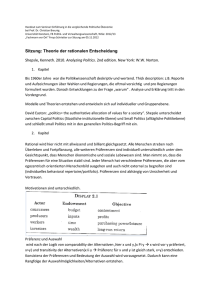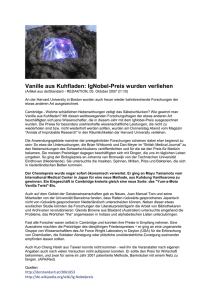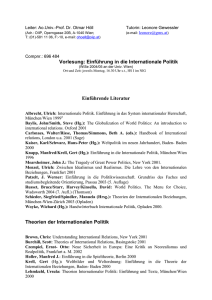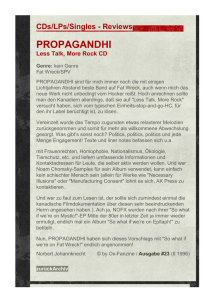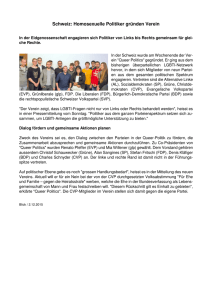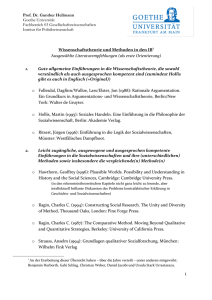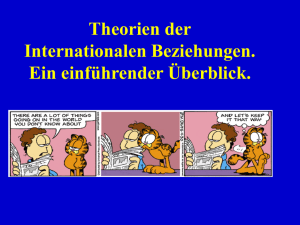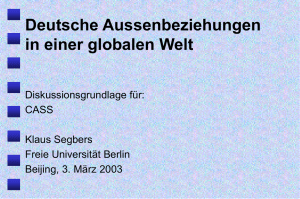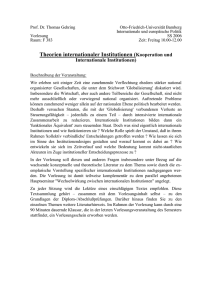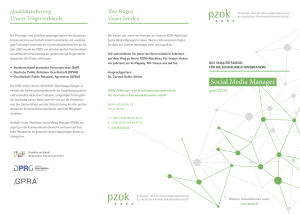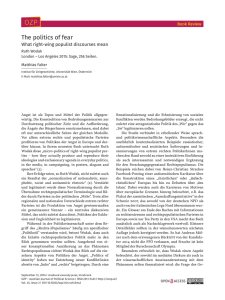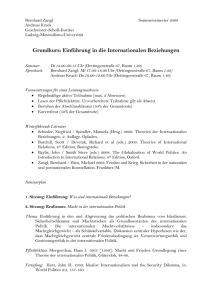Plan der Vorlesung - Geschwister-Scholl
Werbung
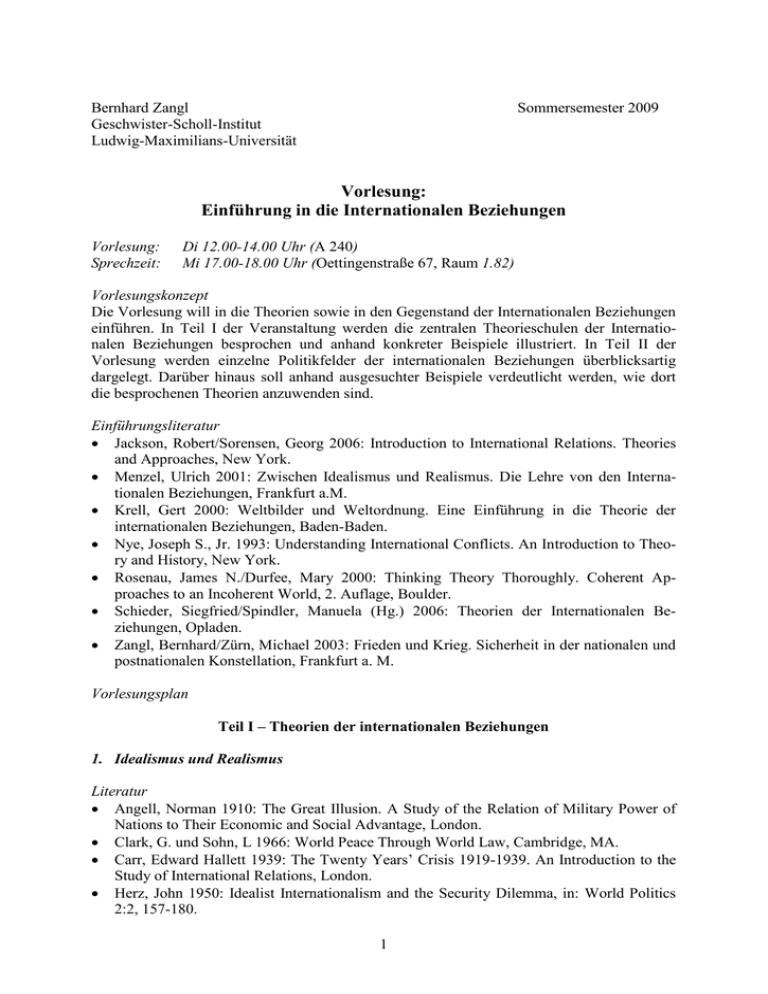
Bernhard Zangl Geschwister-Scholl-Institut Ludwig-Maximilians-Universität Sommersemester 2009 Vorlesung: Einführung in die Internationalen Beziehungen Vorlesung: Sprechzeit: Di 12.00-14.00 Uhr (A 240) Mi 17.00-18.00 Uhr (Oettingenstraße 67, Raum 1.82) Vorlesungskonzept Die Vorlesung will in die Theorien sowie in den Gegenstand der Internationalen Beziehungen einführen. In Teil I der Veranstaltung werden die zentralen Theorieschulen der Internationalen Beziehungen besprochen und anhand konkreter Beispiele illustriert. In Teil II der Vorlesung werden einzelne Politikfelder der internationalen Beziehungen überblicksartig dargelegt. Darüber hinaus soll anhand ausgesuchter Beispiele verdeutlicht werden, wie dort die besprochenen Theorien anzuwenden sind. Einführungsliteratur Jackson, Robert/Sorensen, Georg 2006: Introduction to International Relations. Theories and Approaches, New York. Menzel, Ulrich 2001: Zwischen Idealismus und Realismus. Die Lehre von den Internationalen Beziehungen, Frankfurt a.M. Krell, Gert 2000: Weltbilder und Weltordnung. Eine Einführung in die Theorie der internationalen Beziehungen, Baden-Baden. Nye, Joseph S., Jr. 1993: Understanding International Conflicts. An Introduction to Theory and History, New York. Rosenau, James N./Durfee, Mary 2000: Thinking Theory Thoroughly. Coherent Approaches to an Incoherent World, 2. Auflage, Boulder. Schieder, Siegfried/Spindler, Manuela (Hg.) 2006: Theorien der Internationalen Beziehungen, Opladen. Zangl, Bernhard/Zürn, Michael 2003: Frieden und Krieg. Sicherheit in der nationalen und postnationalen Konstellation, Frankfurt a. M. Vorlesungsplan Teil I – Theorien der internationalen Beziehungen 1. Idealismus und Realismus Literatur Angell, Norman 1910: The Great Illusion. A Study of the Relation of Military Power of Nations to Their Economic and Social Advantage, London. Clark, G. und Sohn, L 1966: World Peace Through World Law, Cambridge, MA. Carr, Edward Hallett 1939: The Twenty Years’ Crisis 1919-1939. An Introduction to the Study of International Relations, London. Herz, John 1950: Idealist Internationalism and the Security Dilemma, in: World Politics 2:2, 157-180. 1 Menzel, Ulrich 2001: Zwischen Idealismus und Realismus. Die Lehre von den Internationalen Beziehungen, Frankfurt a.M. Morgenthau, Hans J. 1948: Politics among Nations. The Struggle for Power and Peace, New York. Woolf, L.S. 1916: International Government, New York. Zimmern, A.E. 1936: The League of Nations and the Rule of Law 1918-1935, London. 2. Neorealismus Literatur Brown, Michael E./Lynn-Jones, Sean M./Miller, Steven E. (Hg.) 1995: The Perils of Anarchy. Contemporary Realism and International Security, Cambridge, MA. Grieco, Joseph M. 1990: Cooperation among Nations. Europe, America, and Non-Tariff Barriers to Trade, Ithaca/London. Guzzini, Stefano 1998: Realism in International Relations and International Political Economy, London/New York. Keohane, Robert O. (Hg.) 1986: Neorealism and Its Critics, New York. Mearsheimer, John J. 2001: The Tragedy of Great Power Politics, New York. Vasquez, John A. 1998: The Power of Power Politics. From Classical Realism to Neotraditionalism, Cambridge. Waltz, Kenneth N. 1954: Man, the State and War. A Theoretical Analysis, New York. Waltz, Kenneth N. 1979: Theory of International Politics, New York. Waltz, Kenneth N. 1981: The Spread of Nuclear Weapons. More May be Better, in: Adelphi Paper 171, London. Waltz, Kenneth N. 2000: Structural Realism after the Cold War, in: International Security 25:1, 5-41. 3. Liberalismus Literatur Doyle, Michael 1983: Kant, Liberal Legacies, and Foreign Affairs, in: Philosophy and Public Affairs 12:3, 205-235 and 12:4, 323-353. Kant, Immanuel 1795: Zum ewigen Frieden. Ein philosophischer Entwurf, Königsberg. Moravcsik, Andrew 1997: Taking Preferences Seriously: A Liberal Theory of International Politics, in: International Organization 51:4, 513-553. Moravcsik, Andrew 1998: The Choice for Europe. Social Purpose and State Power from Messina to Maastricht, Ithaca, NY. Moravcsik, Andrew 1993: Integrating International and Domestic Theories of International Bargaining, in: Evans, Peter B./Jacobson, Harold K./Putnam, Robert D. (Hg.): Doubleedged Diplomacy. International Bargaining and Domestic Politics, Berkeley, CA, 3-42. Oneal, John R./Russett, Bruce M. 1999: The Kantian Peace: The Pacific Benefits of Democracy, Interdependence, and International Organizations, 1885-1992, in: World Politics 52:1, 1-37. Russett, Bruce 1993: Grasping the Democratic Peace. Principles for a Post-Cold War World, Princeton, NJ. Russett, Bruce/Oneal, John R. 2001: Triangulating Peace. Democracy, Interdependence, and International Organization, New York. 2 Snyder, Jack 1991: Myths of Empire: Domestic Politics and International Ambition, Ithaca, NY. 4. Institutionalismus Literatur Hasenclever, Andreas/Mayer, Peter/Rittberger, Volker 1997: Theories of International Regimes, Cambridge, 23-82. Keohane, Robert O. 1983: The Demand for International Regimes, in: Krasner, Stephen D. (Hg.): International Regimes, Ithaca, 141-172. Keohane, Robert O. 1984: After Hegemony. Cooperation and Discord in the World Political Economy, Princeton, NJ. Keohane, Robert O. 1989: International Institutions and State Power. Essays in International Relations Theory, San Francisco, CA. Koremenos, Barbara/Lipson, Charles/Snidal, Duncan (Hg.) 2001: The Rational Design of International Institutions (Special Issue of International Organisation 55:4), Boston, NE. Krasner, Stephen D. (Hg.) 1983: International Regimes, Ithaca, NY. Martin, Lisa 1992: Interests, Power and Mulitöateralism, in: International Organization 46:4, 765-792. Zangl, Bernhard 1999: Interessen auf zwei Ebenen. Internationale Regime in der Agrarhandels-, Währungs- und Walfangpolitik, Baden-Baden. Zürn, Michael 1992: Interessen und Institutionen in der internationalen Politik. Grundlegung und Anwendungen des situationsstrukturellen Ansatzes, Opladen. 5. Konstruktivismus Literatur Checkel, Jeffrey T. 1998: The Constructivist Turn in International Relations Theory, in: World Politics 50, 324-348. Dessler, David 1999: Constructivism within a Positivist Social Science, in: Review of International Studies 25, 123-137. Hasenclever, Andreas/Mayer, Peter/Rittberger, Volker 1997: Theories of International Regimes, Cambridge, 136-210. Hurrell, Andrew 1993: International Society and the Study of International Regimes, in: Rittberger, Volker (Hg.): Regime Theory and International Relations, Oxford, 49-72. Katzenstein, Peter (Hg.) 1996: The Culture of National Security. Norms and Identity in World Politics, New York. Kratochwil, Friedrich/Ruggie, John Gerard 1986: International Organization: a State of the Art on an Art of the State, in: International Organization 40:4, 753-775. Müller, Harald 1994: Internationale Beziehungen als kommunikatives Handeln. Zur Kritik der utilitaristischen Handlungstheorien, in: Zeitschrift für Internationale Beziehungen 1:1, 15-44. Risse, Thomas 2000: Let’s Argue! Persuasion and Deliberation in International Relations, in: International Organization 54:1. Ulbert, Cornelia 2005: Konstruktivistische Analysen der internationalen Politik. Theoretische Ansätze und methodische Herangehensweisen, in: Ulbert, Cornelia/Weller Christoph (Hg.): Konstruktivistische Analysen der internationalen Politik , Wiesbaden, 934. 3 Wendt, Alexander 1999: Social Theory of International Politics, Cambridge. Wendt, Alexander 1992: Anarchy Is What States Make of It, in: International Organization 46, 391-425. 6. Theorien jenseits der Theorieschulen Literatur Burchill, Scott et al. 2005 (Hg.): Theories of International Relations, London. Hellmann, Gunther/Wolf, Klaus-Dieter/Zürn, Michael 2003 (Hg.) Die neuen Internationalen Beziehungen. Forschungsstand und Perspektiven in Deutschland, Baden Baden Katzenstein, Peter/Keohane, Robert/Krasner, Stephen 1998: International Organization and the Study of World Politics, in: International Organization 52:4, 645-685. Krell, Gert 2000: Weltbilder und Weltordnung. Eine Einführung in die Theorie der internationalen Beziehungen, Baden-Baden. Nye, Joseph S., Jr. 1993: Understanding International Conflicts. An Introduction to Theory and History, New York. Schieder, Siegfried/Spindler, Manuela (Hg.) 2006: Theorien der Internationalen Beziehungen, Opladen. Zangl, Bernhard/Zürn, Michael 2003: Frieden und Krieg. Sicherheit in der nationalen und postnationalen Konstellation, Frankfurt a.M. Teil II – Politikfelder der internationalen Beziehungen 7. Sicherheit I (Krieg u. Frieden) Literatur Chesterman, Simon 2003: Just War or Just Peace? Humanitarian Intervention and International Law, Oxford. Cortright, David/Lopez George A. 2000: The Sanctions Decade. Assessing UN Strategies in the 1990s, Boulder, CO. Fortna Virgina Page 2004: Does Peacekeeping Keep Peace? International Intervention and the Duration of Peace After Civil War, in: International Studies Quarterly, 48:2, 269-292 Gareis, Sven Bernhard/Varwick, Johannes 2007: Die Vereinten Nationen, Opladen. Heupel, Monika/Zangl, Bernhard 2004: Von „alten“ und „neuen“ Kriegen – Zum Gestaltwandel kriegerischer Gewalt, in: Politische Vierteljahresschrift 45:3, 346-369. Holsti, Kalevi J. 1991: Peace and War: Armed Conflicts and International Order, 16481989, Cambridge. Kaldor, Mary 1999: New and Old Wars: Organized Violence in a Global Era, Cambridge. Malone, David M. (ed) 2004: The UN Security Council. From the Cold War to the 21st Century, London. Mingst, Karen A./Karns, Margaret P. 2000: The United Nations in the Post-Cold War Era, Boulder, CO. Price, Richard/Zacher, Mark 2004: The United Nations and Global Security, New York. Taylor, Paul/Groom, A.J.R. 2000 (Hg.): The United Nations at the Millennium. The Principal Organs, London. 4 Weiss, Thomas/Forsythe, David P./Coate, Roger A. (Hg.) 2004: The United Nations and Changing World Politics, 4th edition, Boulder, CO. 8. Sicherheit II (Globale Bedrohungen) Literatur Beckman, Peter R./Crumlish, Paul W./Dobkowski, Michael N./Lee, Steven P. 2000: The Nuclear Predicament: Nuclear Weapons in the Twenty-First Century, 3rd edition, Upper Saddle River, NJ. Bergen, Peter L. 2001: Holy War Inc.: Inside the Secret World of Osama bin Laden, London. Byman, Daniel, 2004: Al-Qaeda as an Adversary: Do We Understand Our Enemy? in: World Politics 56:1, 139-163 Cronin, Audrey Kurth 2002: Behind the Curve: Globalization and International Terrorism, in: International Security 27:3, 30-58. den Dekker, Guido 2001: The Law of Arms Control: International Supervision and Enforcement, Den Haag. Häckel, Erwin/Stein, Gotthard (Hg.) 2000: Tightening the Reins: Towards a Strengthened International Nuclear Safeguards System, Berlin. Hansen, Lene 2001: Gender, Nation, Rape. Bosnia and the Construction of Security, in: International Feminist Journal of Politics 3:1, 55-75. Howard, Peter 2004: Why Not Invade North Korea? Threats, Language Games, and U.S. Foreign Policy, in: International Studies Quarterly 48:4, 805-828. Laqueur, Walter 1999: The New Terrorism: Fanaticism and the Arms of Mass Destruction, Oxford. Larsen, Jeffrey A. (Hg.) 2002: Arms Control: Cooperative Security in a Changing Environment, Boulder, CO. Müller, Harald/Fischer, David/Kötter, Wolfgang 1994: Nuclear Non-Proliferation and Global Order, Oxford. Schneckener, Ulrich 2006: Transnationaler Terrorismus. Charakter und Hintergründe des neuen Terrorismus, Frankfurt a.M. Talbott, Strobe/Chanda, Nayan 2001: The Age of Terror: America and the World After September 11th, New York. Tanter, Raymond 1998: Rogue Regimes, Terrorism and Proliferation, Houndsmill. 9. Handelsbeziehungen Literatur Gilpin, Robert 2000: The Challenge of Global Capitalism. The World Economy in the 21st Century, Princeton, NJ. Hudec, Robert E. 1993: Enforcing International Trade Law. The Evolution of the Modern GATT Legal System, New Hampshire. Jackson, John H. 1998: The World Trade Organization. Constitution and Jurisprudence, London. Jackson, John H. 1999: The World Trading System: Law and Policy of International Economic Relations, Cambridge, MA. Kahler, Miles 1995: International Institutions and the Political Economy of Integration, Washington D.C.. 5 Kapstein, Ethan Barnaby 1994: Governing the Global Economy: International Finance and the State, Cambridge Mosley, Layna. 2003. Global Capital and National Governments, Cambridge. Petersmann, Ernst-Ulrich (Hg.) 1997: International Trade Law and the GATT/WTO Dispute Settlement System, Den Haag. Ruggie, John Gerard 1998: Embedded Liberalism and the Postwar Economic Regimes, in: Constructing the World Polity. Essays on International Institutionalization, London, 6277. Schrade, Christine 1997: Machtstaat, Handelsstaat oder Zivilstaat? Deutsche Entwicklungspolitik nach dem Ende des Ost-West-Konflikts, in: Zeitschrift für Internationale Beziehungen 4: 2, 255-294. Wilkinson, Rorden 2000: Multilateralism and the World Trade Organisation: The Architecture and Extension of International Trade Regulation, London. 10. Finanzbeziehungen Literatur Eichengreen, Barry 1996: Globalizing Capital. A History of the International Monetary System, Princeton, NJ. Genschel, Philipp/ Plümper, Philipp 1996. Wenn Reden Silber und Handeln Gold ist. Kooperation und Kommunikation in der internationalen Bankenregulierung, in: Zeitschrift für Internationale Beziehungen 3:2, 225-253. Harrigan, Jane/Wang, Chengang/El-Said, Hamed 2006: The Economic and Political Determinants of IMF and World Bank Lending in the Middle East and North Africa, in: World Development 34: 2, 247-270. Helleiner, Eric 1994: States and the Reemergence of Global Finance. From Bretton Woods to the 1990s, Ithaca, NY. Kapstein, Ethan Barnaby 1994: Governing the Global Economy: International Finance and the State, Cambridge Mosley, Layna. 2003. Global Capital and National Governments, Cambridge. Neumayer, Eric 2003: The Determinants of Aid Allocation by Regional Multilarteral Development Banks and United Nations Agencies, in: International Studies Quarterly 47: 1, 101-122. Neumayer, Eric 2006: The Pattern of Aid Giving: The Impact of Good Governance on Development Assistance, London. Reinicke, Wolfgang H. 1995: Banking, Politics, and Global Finance. American Commercial Banks and Regulatory Change, 1980-1990, Aldershot. 11. Umweltbeziehungen Literatur Bailey, Jennifer L. 2008: Arrested Development: The Fight to End Commercial Whaling as a Case of Failed Norm Change, in: European Journal of International Relations, 14:2, 289-318 Gehring, Thomas/Oberthür, Sebastian (Hg.) 1997: Internationale Umweltregime: Umweltschutz durch Verhandlungen und Verträge, Opladen. Haas, Peter M. 1990: Saving the Mediterranean: The Politics of International Environmental Cooperation, New York. 6 Haas, Peter M 1992: Banning Chlorofluorocarbons. Epistemic Community Efforts to Protect Stratospheric Ozone, in: International Organization 46:1,187-224. Haas, Peter M./Keohane, Robert O./Levy, Marc A. (Hg.) 1993: Institutions for the Earth. Sources of Effective International Environmental Protection, Cambridge, MA. Haas, Peter M./Speth, James G. 2006: Global Environmental Governance, Washington. Litfin, Karen 1995: Framing Science: Precautionary Discourse and the Ozone Treaties, in: Millennium 24: 2, 251-277. Luterbacher, Urs/Sprinz, Detlef F. (Hg.) 2001: International Relations and Global Climate Change, Camrbdueg, MA. Mitchell, Ronald 1994: Regime Design Matters: Intentional Oil Pollution and Treaty Compliance, in: International Organization 48: 3, 425-458. Parsons, Edward 2003: Protecting the Ozone Layer. Science and Strategy, Oxford. Pettenger, Mary E. (Hg.) 2007: The Social Construction of Climate Change. Power, Knowledge Norms, Discourses, Aldershot. Chasek, Pamela S./Brown, Janet Welsh/Downie, David 2006: Global Environmental Politics, 6. Auflage, Boulder, CO. Victor, David G./Raustiala, Kal/Skolnikoff, Eugene B. (Hg.) 1998: The Implementation and Effectiveness of International Environmental Commitments: Theory and Practice, Cambridge, MA. Miles, Edward/Underdal, Arild/Andresen, Steinar/Wettestad, Jørgen/Skaerseth, Jon B. 2001: Environmental Regime Effectiveness: Confronting Theory with Evidence, Cambridge, MA. 12. Menschenrechte Literatur Alston, Philip (Hg.) 1995: The United Nations and Human Rights. A Critical Appraisal, Oxford. Boekle, Henning 1998: Die Vereinten Nationen und der internationale Schutz der Menschenrechte: Eine Bestandsaufnahme, in: Aus Politik und Zeitgeschichte, 46-47, 3– 17. Donnelly, Jack 1998: International Human Rights, 2nd edition, Boulder, CO. Forsythe, David P. 2000: Human Rights and International Relations, Cambridge. Krasner, Stephen D. 1999: Sovereignty: Organized Hypocrisy, Princeton, NJ. Krasner, Stephen D. 1993: Sovereignty, Regimes, and Human Rights, in: Rittberger, Volker/Mayer, Peter (Hg.): Regime Theory and International Relations, Oxford, 139-167. Liese, Andrea 2006: Staaten am Pranger. Zur Wirkung internationaler Regime auf innerstaatliche Menschenrechtspolitik, Wiesbaden. Moravcsik, Andrew 2000: The Origins of Human Rights Regimes: Democratic Delegation in Postwar Europe, in: International Organization 54:2, 217ff. Risse, Thomas/Jetschke, Anja/Schmitz, Hans-Peter 2002: Die Macht der Menschenrechte: Internationale Normen, kommunikative Prozesse und politischer Wandel in den Ländern des Südens, Baden-Baden. Risse, Thomas/Ropp, Stephen/Sikkink, Kathryn 1999: The Power of Human Rights: International Norms and Domestic Change, Cambridge. Steiner, Henry J./Alston, Philip 2000: International Human Rights in Context: Law, Politics, Morals. Text and Materials, Oxford. 7 13. Global Governance Literatur Czempiel, Ernst-Otto/Rosenau, James N. (Hg.) 1992: Governance without Government: Order and Change in World Politics, Cambridge. Dingwerth, Klaus 2003: Die demokratische Legitimität globaler Politiknetzwerke: Analyse der Weltstaudammkommission, in: Zeitschrift für Internationale Beziehungen 10:1, 69-109 Dingwerth, Klaus/Pattberg, Philipp 2006: Global Governance as a Perspective on World Politics, in: Global Governance 12:2, 185-203. Held, David 1995: Democracy and the Global Order. From the Modern State to Cosmopolitan Governance, Cambridge. Held, David/Anthony McGrew/David Goldblatt/Jonathan Perraton 1999: Global Transformations. Politics, Economics and Culture, Cambridge. Reinicke, Wolfgang 1998: Global Public Policy. Governing without Government? Washington D.C.. Rittberger, Volker/Zangl, Bernhard 2006: International Organization. Polity, Politics and Policies, New York. Zürn, Michael 1998: Regieren jenseits des Nationalstaates. Denationalisierung und Globalisierung als Chance, Frankfurt a. M. 14.Staatlichkeit im Wandel Literatur Genschel, Philipp/Zangl, Bernhard 2008: Metamorphosen des Staates – vom Herrschaftsmonopolisten zum Herrschaftsmanager, in: Leviathan 3/08. Leibfried, Stephan/Zürn, Michael (Hrsg.) 2005: Transformations of the State, Cambridge. Sorensen, Georg 2001: Changes in Statehood. The Transformation of International Relations, Houndsmills. Hurrelmann, Achim/Leibfried, Stephan/Martens, Kerstin/Mayer, Peter (Hrsg.): Zerfasert der Nationalstaat? Die Internationalisierung politischer Verantwortung, Frankfurt/M. 8
